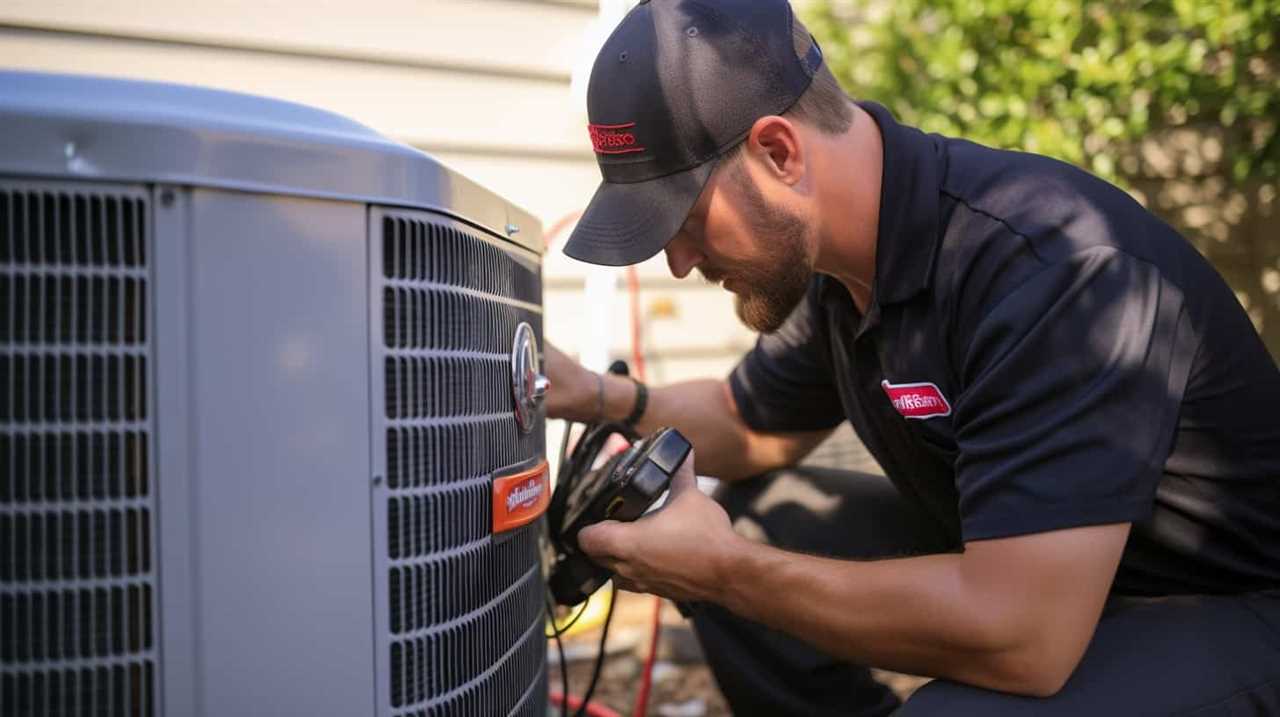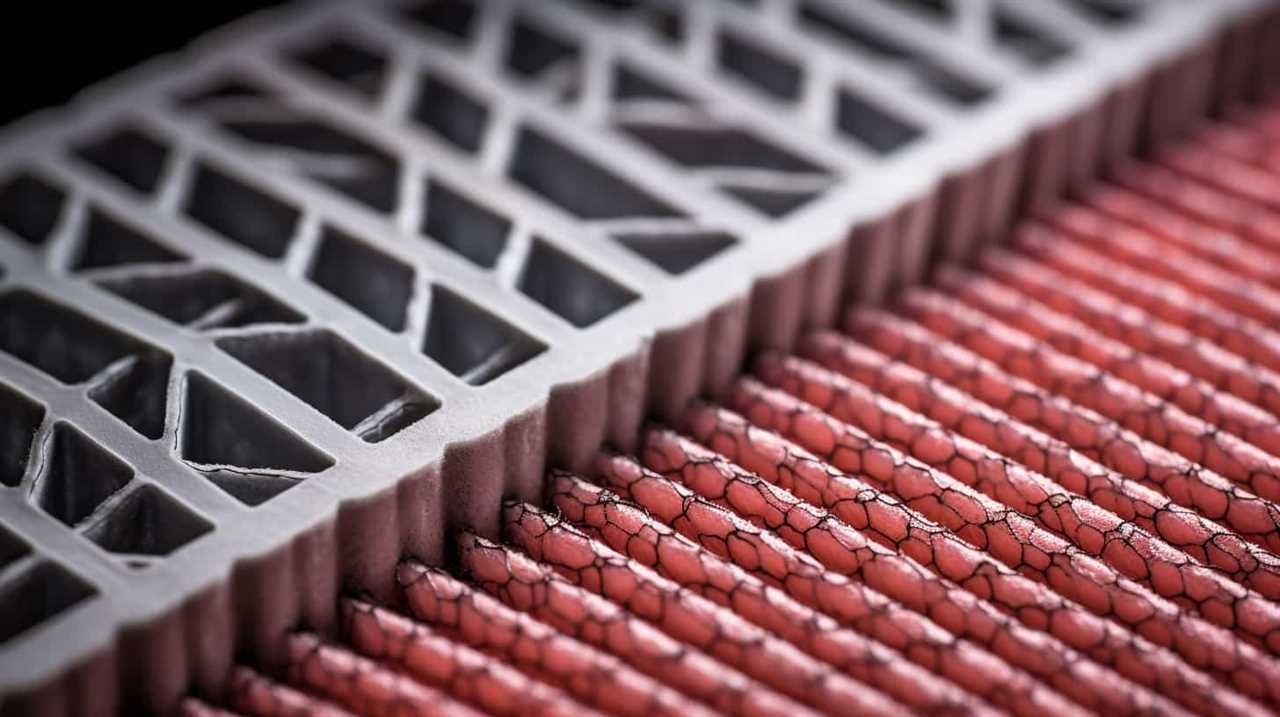Fed up with steep heating bills? Search no more – we have the perfect solution for you.
With geothermal heat pumps installation, we can slash your heating expenses and keep your home warm and cozy. These efficient systems harness the power of the earth to provide sustainable heating year-round.
In this article, we’ll explain how geothermal heat pumps work, the benefits they offer, and the installation process.
Get ready to master the art of saving money while staying warm!

Key Takeaways
- Geothermal heat pumps are highly energy efficient and can significantly reduce reliance on fossil fuels, resulting in substantial savings on energy bills.
- Geothermal heat pumps have a longer lifespan compared to other heating systems, reducing the need for frequent replacements and maintenance.
- Various incentives, such as tax credits and rebates, are available to offset the installation costs of geothermal heat pumps.
- Proper insulation, choosing the right size of heat pump, and regular maintenance are crucial for optimizing the efficiency and performance of geothermal heat pumps.
How Geothermal Heat Pumps Work
We’ll explain how geothermal heat pumps work to efficiently heat and cool your home.
Geothermal heat pump technology utilizes the earth’s natural heat to provide a renewable energy source for heating and cooling systems. The system consists of three main components: the ground loop, the heat pump unit, and the distribution system.
First, the ground loop is installed underground, where it absorbs heat from the earth. This loop contains a special fluid that circulates through pipes and transfers the heat to the heat pump unit.
The heat pump then compresses the heat, raising its temperature, and transfers it to the distribution system. This system can distribute the heat throughout your home during the winter or transfer the heat out of your home during the summer, effectively cooling it.

Geothermal heat pumps offer an efficient and eco-friendly solution for maintaining a comfortable indoor temperature year-round.
Benefits of Geothermal Heat Pumps
Let’s explore the benefits of geothermal heat pumps and how they can save you money on heating costs. Geothermal heat pump technology offers numerous advantages over traditional heating systems. Firstly, they are highly energy efficient, using the constant temperature of the ground to transfer heat instead of relying on fossil fuels. This can result in significant savings on your energy bills. Secondly, geothermal heat pumps have a longer lifespan compared to other heating systems, reducing the need for frequent replacements. Additionally, these systems operate quietly and require minimal maintenance. Lastly, there are various geothermal heat pump incentives available, such as tax credits and rebates, which can help offset the initial installation costs. Overall, investing in geothermal heat pump technology can provide long-term financial benefits while reducing your carbon footprint.
| Benefits of Geothermal Heat Pumps | ||
|---|---|---|
| Energy Efficiency | Longer lifespan | Cost Savings |
| Environmentally Friendly | Quiet Operation | Minimal Maintenance |
| Geothermal Heat Pump Incentives |
Understanding Geothermal Heat Pump Efficiency
Now that we’ve explored the benefits of geothermal heat pumps, let’s delve into understanding their efficiency.
Geothermal heat pump technology offers a highly efficient way of heating and cooling homes. Here are five important factors that contribute to the efficiency of geothermal heat pumps:

-
Ground temperature: The temperature of the ground affects the efficiency of the heat exchange process. Warmer ground temperatures result in higher efficiency.
-
Insulation: Proper insulation in your home reduces heat loss and improves the overall efficiency of the system.
-
System size: Installing the right size of geothermal heat pump ensures optimal performance and efficiency.
-
Heat pump type: Different heat pump types have varying efficiency ratings. It’s important to choose a model with a high coefficient of performance (COP).

-
Regular maintenance: Keeping your geothermal heat pump well-maintained ensures it operates at peak efficiency.
Understanding these geothermal heat pump efficiency factors is crucial for maximizing the energy-saving potential of your system.
Now let’s move on to the next section where we’ll discuss factors to consider before installing a geothermal heat pump.
Factors to Consider Before Installing a Geothermal Heat Pump
Before installing a geothermal heat pump, there are several factors to consider.

One of the main considerations is the cost-effectiveness of the installation. While geothermal heat pumps may have a higher upfront cost compared to traditional heating systems, they can provide significant savings on energy bills in the long run.
Additionally, it’s important to recognize the environmental benefits of geothermal heat pumps, as they’re highly energy-efficient and produce fewer greenhouse gas emissions.
Cost-Effectiveness of Installation
We should consider the initial investment and long-term savings when evaluating the cost-effectiveness of installing a geothermal heat pump. While the upfront cost of installing a geothermal heat pump may be higher compared to traditional heating systems, the long-term energy savings can make it a cost-effective investment. Here are some factors to consider before installing a geothermal heat pump:
-
Geothermal heat pumps installation cost: The initial cost of installing a geothermal heat pump includes the purchase of the system, labor costs, and any necessary modifications to the property.

-
Geothermal heat pumps energy savings: Geothermal heat pumps are highly efficient and can save homeowners up to 70% on their heating and cooling costs.
-
Available incentives and rebates: Many governments and utility companies offer incentives and rebates to homeowners who install geothermal heat pumps, which can offset the initial installation cost.
-
Maintenance and operational costs: Geothermal heat pumps require regular maintenance, but they’ve lower operational costs compared to traditional heating systems.
-
Lifespan of the system: Geothermal heat pumps have a longer lifespan compared to traditional heating systems, which means homeowners can enjoy cost savings for many years.

Considering these factors, it becomes clear that installing a geothermal heat pump can be a cost-effective solution for long-term energy savings and comfort.
Now, let’s explore the environmental benefits of geothermal heat pumps.
Environmental Benefits of Geothermal
One of the significant environmental benefits of geothermal heat pumps is their ability to reduce carbon emissions. Geothermal heat pumps utilize renewable energy sources, such as the Earth’s natural heat, to provide heating and cooling for residential and commercial buildings. Unlike traditional heating systems that rely on burning fossil fuels, geothermal heat pumps don’t produce carbon dioxide or other greenhouse gases during operation. This reduction in carbon emissions helps to mitigate climate change and decrease the overall environmental impact of heating and cooling systems.
In addition to the reduction of carbon emissions, geothermal heat pumps also have other environmental benefits, including the conservation of natural resources and the protection of air and water quality. With these environmental advantages in mind, it’s important to consider the installation process of geothermal heat pumps.

Geothermal Heat Pump Installation Process
When it comes to the installation process of geothermal heat pumps, there are several key points to consider.
First and foremost, one of the major benefits of geothermal heating is the potential for significant cost savings in the long run.
Additionally, the installation time frame for geothermal heat pumps can vary depending on factors such as the size of the property and the complexity of the system.
Understanding these points can help homeowners make informed decisions about installing geothermal heat pumps.

Benefits of Geothermal Heating
Let’s dive into the benefits of geothermal heating and how the geothermal heat pump installation process can help us save on heating costs.
Here are some advantages of geothermal heating and benefits of geothermal heat pumps:
-
Energy Efficiency: Geothermal heat pumps are highly efficient in extracting heat from the ground, making them more energy-efficient than traditional heating systems.
-
Environmental Friendliness: Geothermal heating produces fewer greenhouse gas emissions and reduces our carbon footprint, contributing to a cleaner and healthier environment.

-
Long Lifespan: Geothermal heat pumps have a longer lifespan compared to other heating systems, providing a reliable and durable heating solution.
-
Low Operating Costs: Geothermal heating systems typically have lower operating costs due to their high efficiency, resulting in significant savings on heating expenses.
-
Versatility: Geothermal heat pumps can also be used for cooling purposes, providing year-round comfort and savings.
Understanding the benefits of geothermal heating and heat pump installation sets the stage for exploring the cost savings potential in the next section.

Cost Savings Potential
As we explore the cost savings potential of the geothermal heat pump installation process, it becomes evident that significant financial benefits can be achieved. Geothermal heat pumps are known for their energy efficiency and long lifespan, which contribute to lower operating costs and reduced maintenance expenses. Additionally, the return on investment (ROI) for geothermal heat pump systems is often higher compared to traditional heating systems.
To illustrate the potential cost savings, let’s take a look at the following table:
| Cost Savings Factors | Geothermal Heat Pump Systems | Traditional Heating Systems |
|---|---|---|
| Energy Efficiency | High | Moderate to Low |
| Lifespan | 20+ years | 10-15 years |
| Maintenance Expenses | Low | Moderate to High |
Installation Time Frame
Our team will guide you through the installation time frame for geothermal heat pump systems, so you know what to expect during the process. Here is an overview of the steps involved and the estimated time required for each:
-
Site Assessment: A thorough evaluation of your property is conducted to determine its suitability for geothermal heat pump installation. This typically takes 1-2 days.

-
System Design: Once the assessment is complete, our team will design a customized geothermal heat pump system for your specific needs. This process can take up to a week.
-
Permitting and Approval: Before installation can begin, necessary permits and approvals must be obtained from local authorities. This step typically takes 1-2 weeks.
-
Equipment Installation: The actual installation of the geothermal heat pump system usually takes 2-3 days, depending on the complexity of the project.
-
Testing and Commissioning: After installation, the system is thoroughly tested and commissioned to ensure its proper functioning. This process usually takes 1-2 days.

By following this installation time frame, you can expect a smooth and efficient process.
Now, let’s explore the cost savings you can achieve with geothermal heat pumps.
Cost Savings With Geothermal Heat Pumps
We can achieve significant cost savings by installing geothermal heat pumps in our homes. Geothermal heat pumps are highly efficient systems that utilize the constant temperature of the earth to provide heating and cooling. The initial cost of installation may be higher compared to traditional heating systems, but the long-term savings make it a worthwhile investment.
To illustrate the potential savings, let’s consider a comparison between a geothermal heat pump and a conventional HVAC system over a span of 10 years:

| System | Total Cost of Ownership |
|---|---|
| Geothermal Heat Pump | $15,000 |
| Conventional HVAC | $20,000 |
As shown in the table, the geothermal heat pump has a lower total cost of ownership. This is due to its higher efficiency, which results in lower energy consumption and reduced utility bills. Additionally, geothermal heat pumps have a longer lifespan, requiring less maintenance and replacement costs.
Maintenance Tips for Geothermal Heat Pumps
When it comes to maintaining geothermal heat pumps, it’s important to regularly schedule professional inspections and cleanings. This will ensure that the system operates efficiently and effectively, reducing the risk of breakdowns and extending the lifespan of the equipment.
In addition to professional servicing, there are some maintenance tips that homeowners can follow to keep their geothermal heat pumps in optimal condition. Here are five important considerations:
- Regularly clean or replace air filters to prevent dirt and debris from clogging the system.
- Inspect the outdoor unit for any obstructions or damage that may affect its performance.
- Check the refrigerant levels and ensure they’re at the recommended level.
- Clean the coils and remove any dirt or debris that may have accumulated.
- Monitor the thermostat settings and adjust them as needed to maintain comfortable indoor temperatures.
Frequently Asked Questions
How Long Do Geothermal Heat Pumps Typically Last?
Geothermal heat pumps typically last around 20-25 years with proper geothermal heat pump maintenance. They offer numerous benefits, including lower operating costs, energy efficiency, and reduced carbon emissions.

Can a Geothermal Heat Pump Be Used for Both Heating and Cooling?
Yes, geothermal heat pumps can be used for both heating and cooling. They provide efficient temperature control by utilizing the stable temperatures underground. This not only saves on heating costs but also offers a range of benefits.
Are Geothermal Heat Pumps Noisy When Operating?
Geothermal heat pumps can be noisy when operating, but there are ways to minimize the noise levels. Proper installation, sound barriers, and regular maintenance can all help reduce the noise from geothermal heat pumps.
What Kind of Financial Incentives or Rebates Are Available for Geothermal Heat Pump Installations?
Financial incentives and rebates can significantly reduce the cost of geothermal heat pump installations. These incentives, combined with the energy savings provided by the heat pump, make it a financially wise choice for homeowners.
Can a Geothermal Heat Pump Be Installed in Any Type of Property, Such as a Residential Home or a Commercial Building?
Geothermal heat pumps can be installed in both residential homes and commercial buildings. They offer numerous benefits, including lower heating costs, energy efficiency, and reduced environmental impact.

Conclusion
In conclusion, geothermal heat pumps are a cost-effective and efficient option for heating your home. By harnessing the Earth’s natural heat, these pumps can significantly reduce heating costs and provide consistent warmth throughout the year.
Just like a hidden treasure, geothermal heat pumps are a valuable investment that can bring long-term savings and comfort to your home.
So, why not tap into the Earth’s energy and slash your heating costs with a geothermal heat pump installation?









